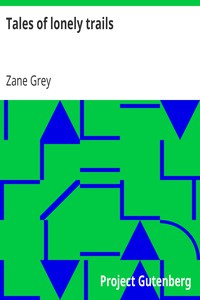Tales of lonely trails by Zane Grey (best affordable ebook reader .TXT) 📗

- Author: Zane Grey
Book online «Tales of lonely trails by Zane Grey (best affordable ebook reader .TXT) 📗». Author Zane Grey
The child is father to the man. In the light of this instinct how easy to understand his boyish cruelty. He is true to nature. Unlimited and infinite in his imagination when he hunts—whether with his toys or with real weapons. If he flings a stone and kills a toad he is instinctively killing meat for his home in the cave. How little difference between the lad and the man! For a man the most poignantly exciting, the most thrillingly wild is the chase when he is weaponless, when he runs and kills his quarry with a club. Here we have the essence of the matter. The hunter is proudest of his achievement in which he has not had the help of deadly weapons. Unconsciously he will brag and glow over that conquest wherein lay greatest peril to him—when he had nothing but his naked hands. What a hot gush of blood bursts over him! He goes back to his barbarian state when a man only felt. The savage lived in his sensations. He saw, heard, smelled, tasted, touched, but seldom thought. The earthy, the elemental of eye and ear and skin surrounded him. When the man goes into the wilderness to change into a hunter that surviving kinship with the savage revives in his being, and all unconsciously dominates him with driving passion. Passion it is because for long he has been restrained in the public haunts of men. His real nature has been hidden. The hunting of game inhibits his thoughts. He feels only. He forgets himself. He sees the track, he hears the stealthy step, he smells the wild scent; and his blood dances with the dance of the ages. Then he is a killer. Then the ages roll back. Then he is brother to the savage. Then all unconsciously he lives the chase, the fight, the death-dealing moment as they were lived by all his ancestors down through the misty past.
What then should be the attitude of a thoughtful man toward this liberation of an instinct—that is to say, toward the game or sport or habit of hunting to kill? Not easily could I decide this for myself. After all life is a battle. Eternally we are compelled to fight. If we do not fight, if we do not keep our bodies strong, supple, healthy, soon we succumb to some germ or other that gets a hold in our blood or lungs and fights for its life, its species, until it kills us. Fight therefore is absolutely necessary to long life, and Alas! eventually that fight must be lost. The savages, the Babylonians, the Persians, the Greeks all worshipped physical prowess in man. Manhood, strength—the symbols of fight! To be physically strong and well a man must work hard, with frequent intervals of change of exercise, and he must eat meat. I am not a great meat eater, but I doubt if I could do much physical labor or any brain work on a vegetable diet. Therefore I hold it fair and manly to go once a year to the wilderness to hunt. Let that hunt be clean hard toil, as hard as I can stand! Perhaps nature created the lower animals for the use of man. If I had been the creator I think I would have made it possible for the so-called higher animal man to live on air.
Somewhere I read a strange remarkable story about monkeys and priests in the jungle of India. An old order of priests had from time out of mind sent two of their comrades into the jungle to live with the monkeys, to tame them, feed them, study them, love them. And these priests told an incredible story, yet one that haunted with its possibilities of truth. After a long term of years in which one certain priest had lived with the monkeys and they had learned truly he meant them no harm and only loved them, at rare moments an old monkey would come to him and weep and weep in the most terrible and tragic manner. This monkey wanted to tell something, but could not speak. But the priest knew that the monkey was trying to tell him how once the monkey people had been human like him. Only they had retrograded in the strange scale of evolution. And the terrible weeping was for loss—loss of physical stature, of speech, perhaps of soul.
What a profound and stunning idea! Does evolution work backward? Could nature in its relentless inscrutable design for the unattainable perfection have developed man only to start him backward toward the dim ages whence he sprang? Who knows! But every man can love wild animals. Every man can study and try to understand the intelligence of his horse, the loyalty of his dog. And every hunter can hunt less with his instinct, and more with an understanding of his needs, and a consideration for the beasts only the creator knows.
XThe last day of everything always comes. Time, like the tide, waits for no man. Anticipation is beautiful, but it is best and happiest to enjoy the present. Live while we may!
On this last day of my hunt we were up almost before it was light enough to see. The morning star shone radiant in the dark gray sky. All the other stars seemed dimmed by its glory. Silent as a grave was the forest. I started a fire, chopped wood so vigorously that I awakened Nielsen who came forth like a burly cave-man; and I washed hands and face in the icy cold brook. By the time breakfast was over the gold of the rising sun was tipping the highest pines on the ridges.
We started on foot, leaving the horses hobbled near camp. All the hounds appeared fit. Even Old Dan trotted along friskily. Pyle, a neighbor of Haught's, had come to take a hunt with us, bringing two dogs with him. For this last day I had formulated a plan. Edd and one of the boys were to take the hounds down on the east side of the great ridge that made the eastern wall of Dude Canyon. R.C. was to climb out on this ridge, and take his position at the most advantageous point. We had already chased half a dozen bears over this saddle, one of which was the big frosty-coated grizzly that Edd and Nielsen had shot at. The rest of us hurried to the head of Dude Canyon. Copple and I were to go down to the first promontories under the rim. The others were to await developments and go where Haught thought best to send them.
Copple and I started down over and around the crags, going carefully until we reached the open slope under the rim-rock. It seemed this morning that I was fresh, eager, agile like a goat on my feet. In my consciousness of this I boasted to Copple that I would dislodge fewer stones and so make less noise than he. The canyon sloped at an angle of about forty-five degrees, and we slid, stepped, jumped and ran down without starting an avalanche.
When we descended to the first bare cape of projecting rock the hour was the earliest in which I had been down under the rim. All the canyon and the great green gulf below were unusually fresh and beautiful. I heard the lonely call of strange birds and the low murmur of running water. An eagle soared in the sunlight. High above us to the east rose the magnificent slope of Dude Canyon. I gazed up to the black and green and silver ascent, up to the gold-tipped craggy crest where R.C. had his stand. I knew he could see me, but I could not see him. Afterward he told me that my red cap shone clearly out of green and gray, so he had no difficulty in keeping track of my whereabouts. The thickets of aspens and oaks seemed now to stand on end. How dark in the shade and steely and cold they looked! That giant ridge still obstructed the sun, and all on this side of it, under its frowning crest and slope was dark and fresh and cool in shadow. The ravines were choked black with spruce trees. Here along this gray shady slant of wall, in niches and cracks, and under ledges, and on benches, were the beds of the bears. Even as I gazed momentarily I expected to see a bear. It looked two hundred yards across the canyon from where we stood, but Copple declared it was a thousand. On our other side capes and benches and groves were bright in sunshine, clear across the rough breaks to the west wall of Dude Canyon. I saw a flock of wild pigeons below. Way out and beyond rolled the floor of the basin, green and vast, like a ridged sea of pines, to the bold black Mazatzals so hauntingly beckoning from the distance. Copple spoke now and then, but I wanted to be silent. How wild and wonderful this place in the early morning!
But I had not long to meditate and revel in beauty and wildness. Far down across the mouth of the canyon, at the extreme southern end of that vast oak thicket, the hounds gave tongue. Old Dan first! In the still cool air how his great wolf-bay rang out the wildness of the time and place! Already Edd and Pyle had rounded the end of the east ridge and were coming up along the slope of Dude Canyon.
"Hounds workin' round," declared Copple. "Now I'll tell you what. Last night a bear was feedin' along that end of the thicket. The hounds are millin' round tryin' to straighten out his trail.... It's a dead cinch they'll jump a bear an' we'll see him."
"Look everywhere!" I cautioned Copple, and my eyes roved and strained over all that vast slope. Suddenly I espied the flash of something black, far down the thicket, and tried to show it to my comrade.
"Let's go around an' down to that lower point of rock. It's a better stand than this. Closer to the thicket an' commands those.... By Golly, I see what you see! That's a bear, slippin' down. Stay with me now!"
Staying with Copple was a matter of utter disregard of clothes, limbs, life. He plunged off that bare ledge, slid flat on his back, and wormed feet first under manzanita, and gaining open slope got up to run and jump into another thicket. By staying with him I saw that I would have a way opened through the brush, and something to fall upon if I fell. He rimmed the edge of a deep gorge that made me dizzy. He leaped cracks. He let





Comments (0)